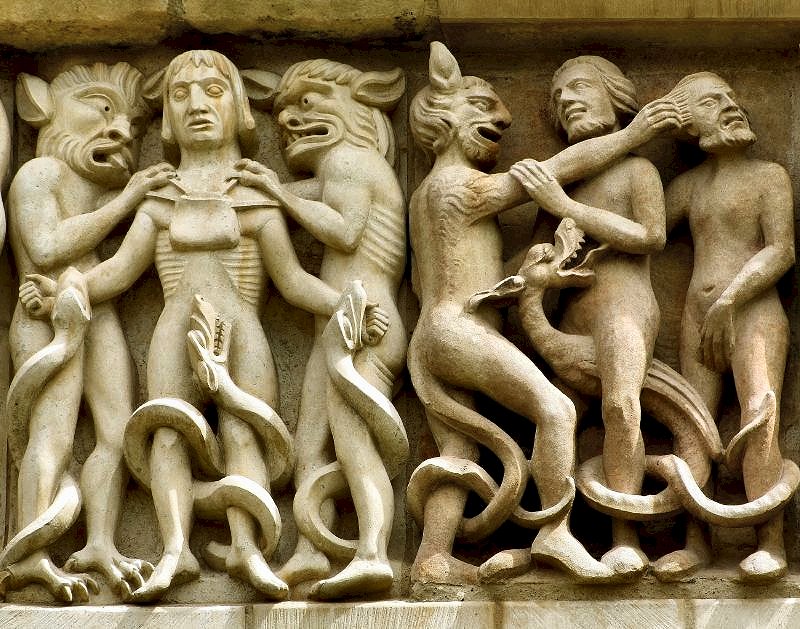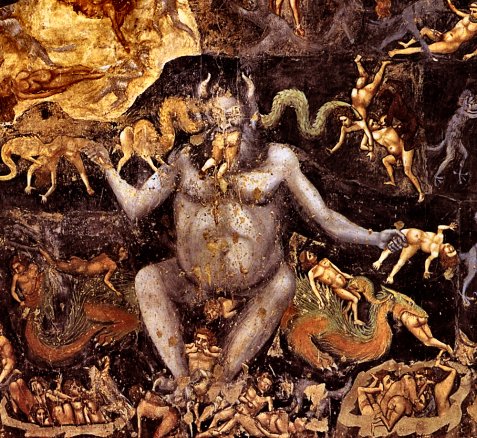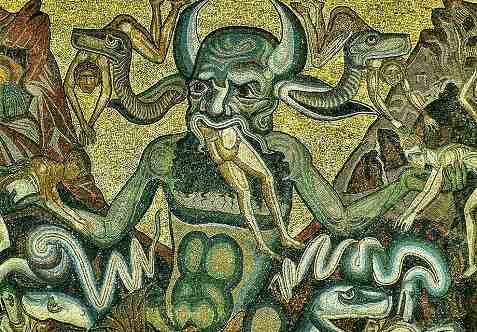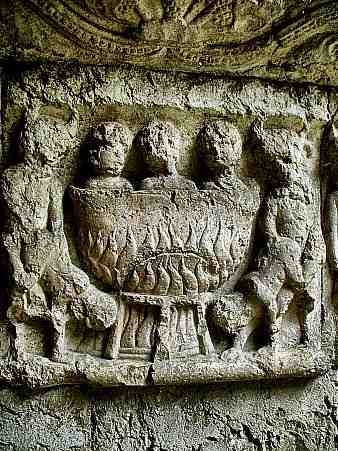What does hell have to do with perfection?
Most of the pieces of writing I have chosen have been on love and consolations.
These are necessary, and love keeps us focused.
However, even the greatest saints had knowledge that hell is real and meditated on hell for the good of their own souls.
Why?
Because we all can get complacent and proud, because we can all fall into spiritual sloth....We can be moved either by love or fear, but perfect love casts out fear; that is, once we are past purgation of sin, we realize, in gratitude, the love of God, which becomes the reason for our own goodness. All we have is from Him.
Here is the Great Gregory on hell, to help us remain honest in our pursuit of perfection. From his Dialogues My comments are in blue. To be continued...and excuse errors in spacing, as I cannot get these out of the document today.
Chapter Forty-three: whether there is one fire in hell, or many.
GREGORY. The fire of hell is but one: yet doth it not in one manner torment all sinners. For every one there, according to the quantity of his sin, |238 hath the measure of his pain. For as, in this world, many live under one and the same sun, and yet do not alike feel the heat thereof: for some be burnt more, and some less: so in that one fire, divers manners of burning be found, for that which in this world diversity of bodies doth, that in the next doth diversity of sins: so that although the fire be there all alike, yet doth it not in one manner and alike burn and torment them that be damned.
Some contemporary teachers in certain seminaries would disagree with the Great Gregory here!
PETER. Shall those, I pray you, which be condemned to that place, burn always, and never have any end of their torments?
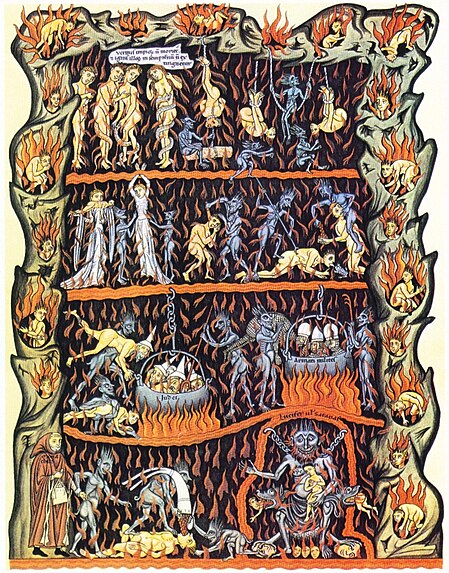 |
| Thanks to Wiki |
GREGORY. Certain it is, and without all doubt most true, that as the good shall have no end of their joys, so the wicked never any release of their torments: for our Saviour himself saith: The wicked shall go into everlasting punishment, and the just into everlasting life.7Seeing, then, true it is, that which he hath promised to his friends: out of all question false it cannot be, that which he hath threatened to his enemies.
PETER. What if it be said that he did threaten eternal pain to wicked livers, that he might thereby restrain them from committing of sins?
GREGORY. If that which he did threaten be false, because his intent was by that means to keep men from wicked life: then likewise must we say that those things are false which he did promise: and that his mind was thereby to provoke us to virtue. But what man, though mad, dare presume so to say? For if he threatened that which he meant not to put into execution: whiles we are desirous to make him merciful, enforced we are likewise (which is horrible to speak) to affirm him to be deceitful.
PETER. Willing I am to know how that sin can justly |239 be punished without end, which had an end when it was committed.
GREGORY. This which you say might have some reason, if the just judge did only consider the sins committed, and not the minds with which they were committed: for the reason why wicked men made an end of sinning was, because they also made an end of their life: for willingly they would, had it been in their power, have lived without end, that they might in like manner have sinned without end. For they do plainly declare that they desired always to live in sin, who never, so long as they were in this world, gave over their wicked life: and therefore it belongeth to the great justice of the supreme judge, that they should never want torments and punishment in the next world, who in this would never give over their wicked and sinful life.
PETER. But no judge that loveth justice taketh pleasure in cruelty: and the end why the just master commandeth his wicked servant to be punished is, that he may give over his lewd life. If, then, the wicked that are tormented in hell fire never come to amend themselves, to what end shall they always burn in those flames?
It is because some do not understand God's mercy and His Goodness that some doubt that there is a hell, or deny that anyone is there.
GREGORY. Almighty God, because he is merciful and full of pity, taketh no pleasure in the torments of wretched men: but because he is also just, therefore doth he never give over to punish the wicked. All which being condemned to perpetual pains, punished they are for their own wickedness: and yet shall they always there burn in fire for some end, and that is, that all those which be just and God's servants may in God behold the joys which they possess, and in them see the torments which they have escaped: to the end that they may thereby always acknowledge themselves grateful to God for his grace, in that they perceive through his divine assistance, what sins they have overcome, which they behold in others to be punished everlastingly. |240
We are created in God's Image and Likeness, and part of this is our free will.
God desires that we love Him freely. Only in freedom is there true love.
PETER. And how, I pray you, can they be holy and saints, if they pray not for their enemies, whom they see to lie in such torments? when it is said to them: Pray for your enemies.72
GREGORY. They pray for their enemies at such time as their hearts may be turned to fruitful penance, and so be saved: for what purpose else do we pray for our enemies, but, as the Apostle saith, that God may give them repentance to know the truth, and recover themselves from the devil, of whom they are held captive at his will? 73
PETER. I like very well of your saying: for how shall they pray for them, who by no means can be converted from their wickedness, and brought to do the works of justice?
Justice is part of the Divine Will. God Himself is Just. We can pray now for those who are dead, but in the next life, there is no longer intercession for those in hell.
We pray for great sinners while they are alive and even do penance.
We pray for the dead now and offer Masses. But, once the final judgement occurs, the door to intercession is shut forever. Therefore, pray now.
GREGORY. You see, then, that the reason is all one, why, in the next life, none shall pray for men condemned for ever to hell fire: that there is now of not praying for the devil and his angels, sentenced to everlasting torments: and this also is the very reason why holy men do not now pray for them that die in their infidelity and known wicked life: for seeing certain it is that they be condemned to endless pains, to what purpose should they pray for them, when they know that no petition will be admitted of God, their just judge? And therefore, if now holy men living upon earth take no compassion of those that be dead and damned for their sins, when as yet they know that themselves do some thing through the frailty of the flesh, which is also to be judged: how much more straightly and severely do they behold the torments of the damned, when they be themselves delivered from all vice of corruption, and be more nearly united to true justice itself: for the force of justice doth so possess their souls, in that they be so intrinsical with the most just judge, that they list not by any means to do that which they know is not conformable to his divine pleasure.74 |241

